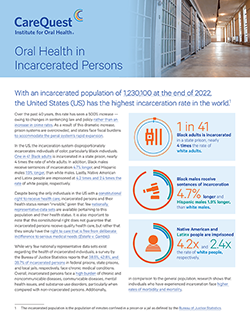A visual report from CareQuest Institute reviews the relationship between incarceration and oral health, highlighting that 50% of incarcerated individuals had a dental problem during the time they were imprisoned.
“First and foremost,” the authors write, “we must prioritize strengthening the oral health care delivery system to incarcerated people.”
Despite being the only individuals in the US with a constitutional right to receive health care, incarcerated persons face numerous barriers to oral health, as do formerly incarcerated individuals. Key findings include:
- When incarcerated individuals receive dental care, damaged teeth are often extracted rather than repaired, due to restrictive treatment guidelines.
- In the US, formerly incarcerated individuals experience worse oral health outcomes, such as a greater likelihood of having periodontal disease, than individuals who have never been incarcerated.
- For individuals with histories of substance use, untreated dental issues can reawaken addiction habits as substance use may feel like the only feasible option to eliminate pain.
With an incarcerated population exceeding 1.2 million, the United States has the highest incarceration rate in the world and a system that disproportionately incarcerates individuals of color, particularly Black individuals.
You may also be interested in:
- Uninsured and in Need, a visual report that delves into the 68.5 million people who lack dental insurance in the US, including why they are uninsured and the effect on their health.
- State of Oral Health Equity in America 2024, an infographic highlighting key findings from the largest nationally representative annual survey on the oral health of adults in the US.
- Lower-Income Families Still Spend More on Dental Care, an analysis of dental care spending and income reveals that poorer families paid 7 times more out-of-pocket for dental care than high-income families.
